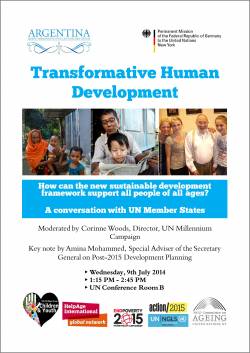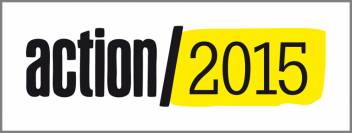 In May, I posted a blog which dared us all to dream about ageing being recognised in the Sustainable Development Goals (SDGs) and preventing older people from again being left behind.
In May, I posted a blog which dared us all to dream about ageing being recognised in the Sustainable Development Goals (SDGs) and preventing older people from again being left behind.
I wanted to give a quick update as we approach the last of 13 “Open Working Group” sessions, where Member States of the UN debate the shape and content of the new set of goals to succeed the MDGs. It’s such an important moment for organisations working with and for older people.
Significant inroads
Well, we can still dream. Thanks to all the efforts of the HelpAge global network, we have made significant inroads.
There is now a “zero draft” of the new SDGs, in its second revision, which is being debated in New York. The latest draft of the SDGs recognises in its introduction that “people of all ages and abilities are at the centre of sustainable development”. If this wording remains, we would be delighted.
We are also pleased that the same draft calls for poverty “of all ages” to be tackled, for social protection floors to be established, for healthy life for all, for an end to violence against women and girls, and for data to be disaggregated and collected by age as well as by gender, disability and other factors.
Ageing must be embedded in the SDGs
But we know too that much more can be done to mainstream and embed responses to ageing throughout the goals and targets. Working as the Stakeholder Group on Ageing, we have come up with a call to Member States for amendments and revisions to the current draft, which the HelpAge network is relaying to policy makers. You can read the statement here.
Over the coming days, it is really important that we continue to raise these points with Member States, whether in country or in New York. We must redouble our efforts, make our voices and suggestions heard loud and clear and from the many different geographies and organisations that a network can make possible.
Policy makers, government, academia, civil society and the public must sit up and take notice of ageing and the urgency of rolling back discrimination and exclusion based on age.
Bringing together youth and ageing groups
Our strategy must also be to make common cause with others. We want to ensure older people are not excluded from the Sustainable Development Goals, and for people to understand that an older person has the same human rights as any other.
To illustrate this, I’m delighted to say we’re working directly with youth organisations who recognise that integrating responses to age in the framework will transform their lives now and into the future.
Two examples of this are happening really soon; today in New York we have organised a joint side event with the Major Group on Children & Youth under the auspices of the UN Millennium Campaign, with the title “Transformative Human Development: How can the new sustainable development framework support all people of all ages?”. You can read the background paper here.
Following this, next month in Nairobi, we will also be holding an intergenerational solidarity dialogue in the context of a continent-wide youth meeting.
 Action/2015
Action/2015
Additionally, there is a forthcoming call to action under the banner of Action/2015, which is a campaign in the making to ensure the voices and opinions of citizens in the global south and north are listened to and acted on as the new goals are set.
Through Action/2015 we have the opportunity to join with a broader group of actors in a global campaign aimed at mobilising our grassroots activists in this work. This is a chance to make the link between the ongoing issues we are campaigning on and the wider framework governments are signing up to.
In the Action/2015 campaign, HelpAge will be calling for youth partners to reinvigorate the Make it Ageless intergenerational campaign, in which young and older work together in solidarity to bring about sustainable change.
We’re putting together an action team that will be co-chaired with a youth organisation. The first step is to register for the campaign online by the end of the week!
Find out more about our work on the Sustainable Development Goals and the post-2015 process.
